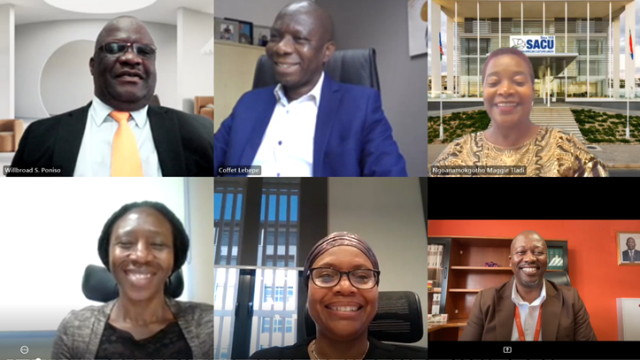
Latest News: The Republic of Namibia assumes the Chairmanship of the SACU Summit, Council of Ministers and Commission, effective from the 15 th July 2024, taking over from the Kingdom of Lesotho. Read More SACU: 114 Years Old! Since 1910!



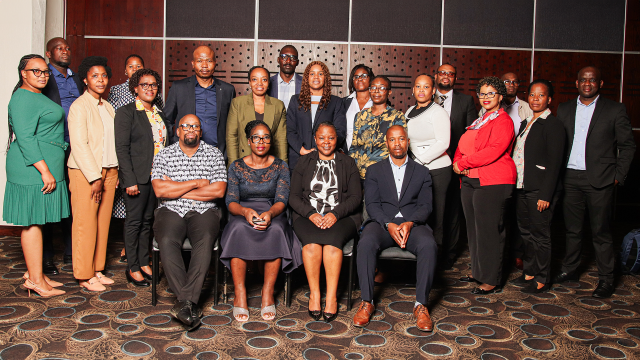
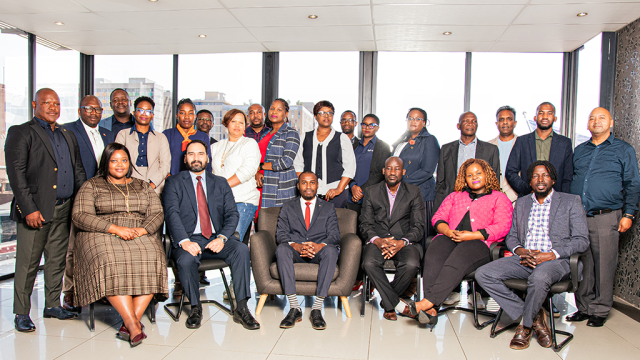
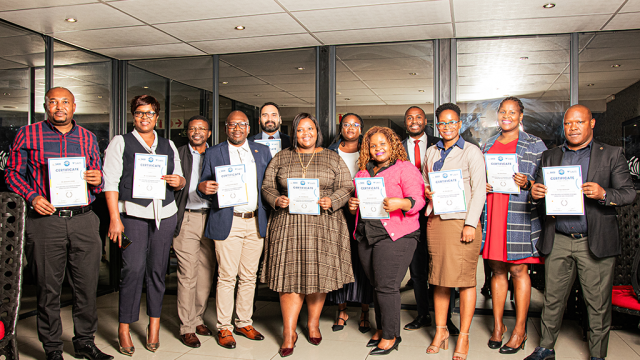
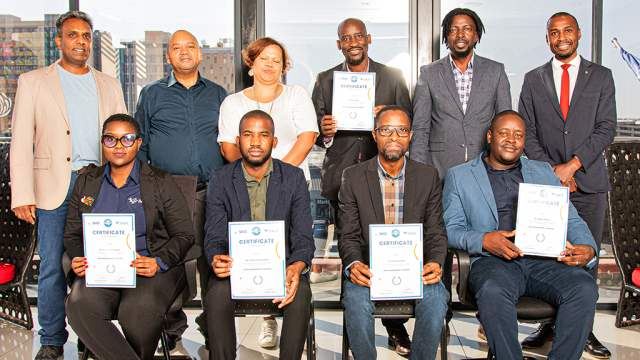

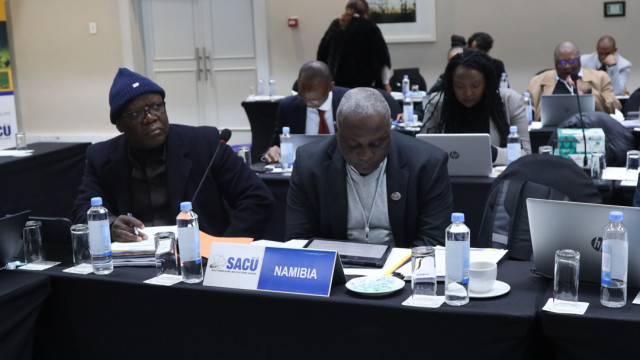

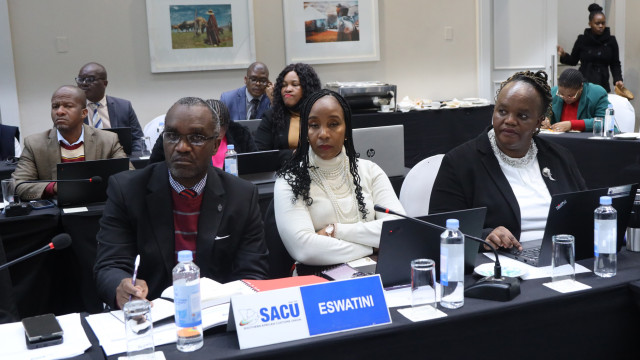
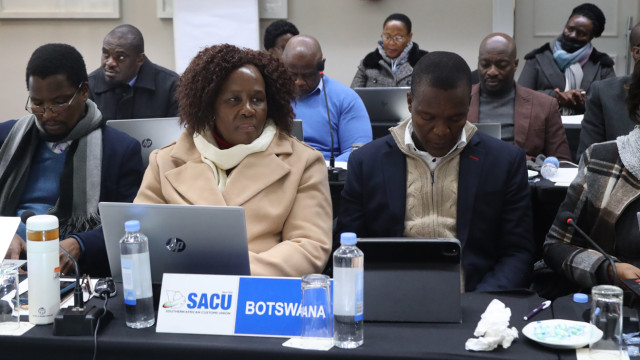


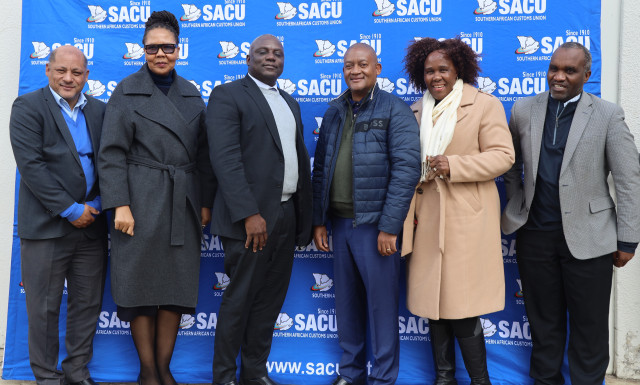
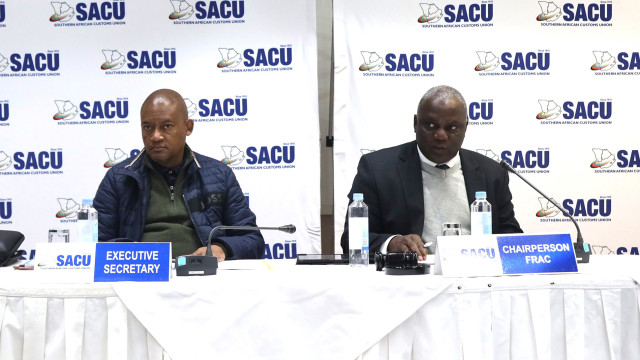

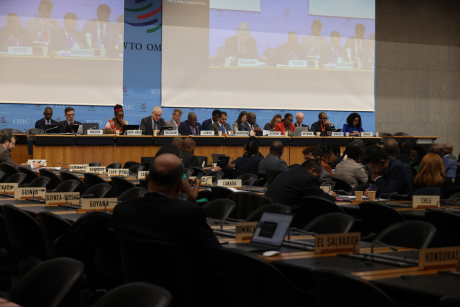
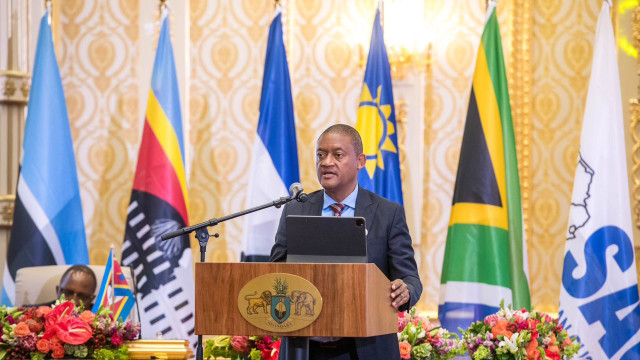
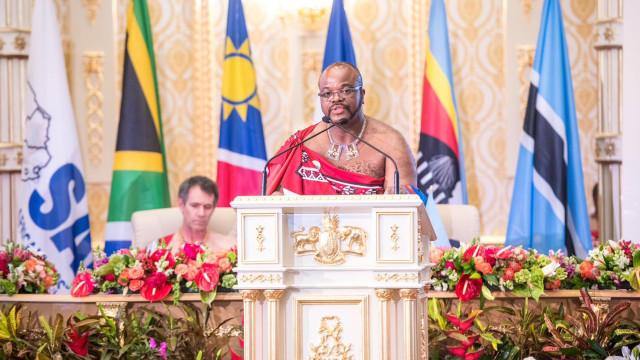
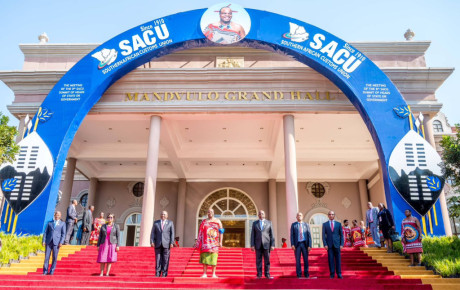
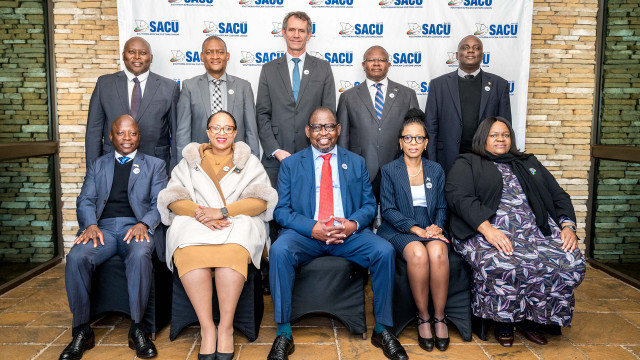
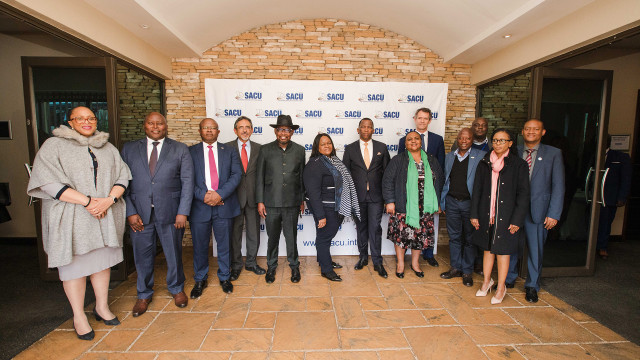
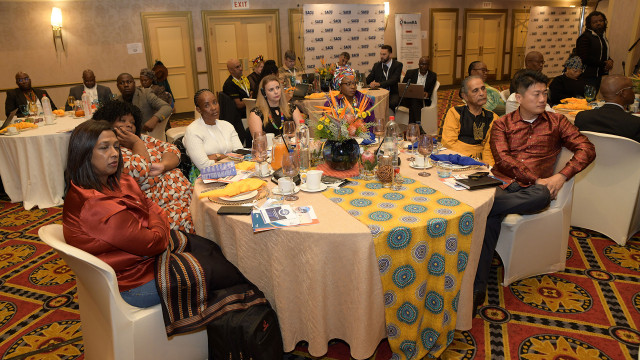
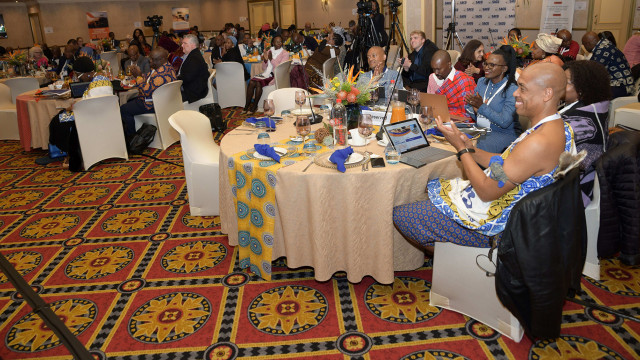
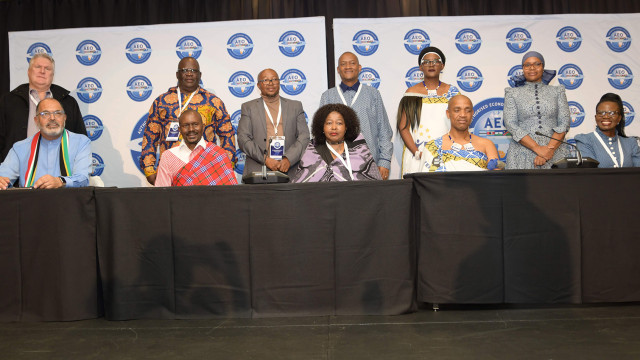
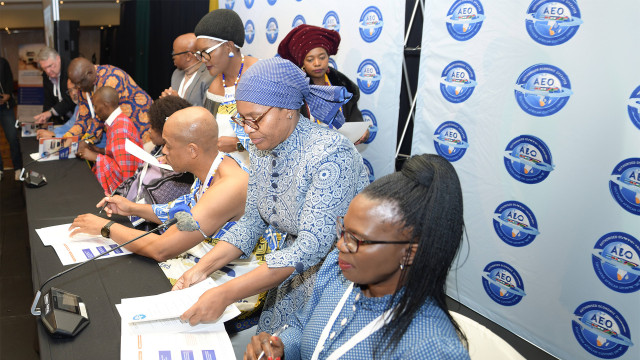
The 23 rd Meeting of Heads of Customs took place on 12 September 2024 to review the progress made on implementing the 2024/25 Annual Work Plan for the Customs Modernisation Programme, part of the Trade Facilitation and Logistics Programme. Key focus areas included the Authorised Economic Operator (AEO) Programme, IT Connectivity of Customs Systems, Risk Management, Compliance and Enforcement, Harmonised Systems Classification, Valuation and Rules of Origin, Capacity Building, Gender Mainstreaming, and Monitoring and Evaluation
On 11 th September 2024, SACU and SARS representatives awarded a Certificate of Appreciation to Pro-Logistics Forwarding (Pty) Ltd for their contribution to the Phase II Training of the SACU Regional AEO Programme, held from 19-23 August 2024 in Pretoria. The training was co-hosted by SACU, SARS, and supported by the WCO and funded by HMRC and SIDA and aimed to equip Validators and Risk Experts from Botswana, Eswatini, Lesotho, and Namibia with practical skills on AEO Validation Procedures to advance the SACU Regional AEO Programme and Mutual Recognition Arrangement. Member State’s physical participation to AEO Validation Exercise was funded by the UK His Majesty’s Revenue & Customs (HMRC) and the Swedish International Development Cooperation Agency (SIDA).
On 11 th September 2024, SACU and SARS representatives awarded a Certificate of Appreciation to Buffalo International Logistics for their contribution to the Phase II Training of the SACU Regional AEO Programme, held from 19-23 August 2024 in Pretoria. The training was co-hosted by SACU, SARS, and supported by the WCO and funded by HMRC and SIDA, aimed to equip Validators and Risk Experts from Botswana, Eswatini, Lesotho, and Namibia with practical skills on AEO Validation Procedures to advance the SACU Regional AEO Programme and Mutual Recognition Arrangement. Member State’s physical participation to AEO Validation Exercise was funded by the UK His Majesty’s Revenue & Customs (HMRC) and the Swedish International Development Cooperation Agency (SIDA).
SACU Technical Experts met in South Africa on 9-10 September 2024 to brainstorm on the EU-SADC and SACUM-UK EPA Tariff Rate Quotas (TRQs) and promote stronger trade ties, ensuring fair use of quotas and boosting economic benefits for the SACU Member States. The meeting was chaired by the Chief Trade Policy Analyst of the Ministry of Industrialisation and Trade of Namibia, Ms. Taina Shimhulu-Kalimba.
Phase II of the SACU Regional Authorised Economic Operator (AEO) Programme training workshop, together with the Regional Training on Risk Management and Data Analytics were held on 19–23 August 2024 in South Africa and was attended by Customs Officers from Botswana, Eswatini, Lesotho, and Namibia to strengthen the implementation of the AEO Programme. Facilitated by experts from South African Revenue Service and the World Customs Organisation, the training focused on enhancing officers' skills in Risk Management, Post Audit Clearance (PCA), and data analytics, essential for combating illicit trade and securing borders. Additionally, participants had an opportunity to take part in practical validation exercises on selected companies in preparation for the AEO Certification and Accreditation on both Compliance and Security. The initiative supports SACU’s Strategic Plan 2022–2027, which aims to enhance the safety and security of the supply chain within the Common Customs Area.
Phase II of the SACU Regional Authorised Economic Operator (AEO) Programme training workshop, together with the Regional Training on Risk Management and Data Analytics were held on 19–23 August 2024 in South Africa and was attended by Customs Officers from Botswana, Eswatini, Lesotho, and Namibia to strengthen the implementation of the AEO Programme. Facilitated by experts from South African Revenue Service and the World Customs Organisation, the training focused on enhancing officers' skills in Risk Management, Post Audit Clearance (PCA), and data analytics, essential for combating illicit trade and securing borders. Additionally, participants had an opportunity to take part in practical validation exercises on selected companies in preparation for the AEO Certification and Accreditation on both Compliance and Security. The initiative supports SACU’s Strategic Plan 2022–2027, which aims to enhance the safety and security of the supply chain within the Common Customs Area.
Phase II of the SACU Regional Authorised Economic Operator (AEO) Programme training workshop, together with the Regional Training on Risk Management and Data Analytics were held on 19–23 August 2024 in South Africa and was attended by Customs Officers from Botswana, Eswatini, Lesotho, and Namibia to strengthen the implementation of the AEO Programme. Facilitated by experts from South African Revenue Service and the World Customs Organisation, the training focused on enhancing officers' skills in Risk Management, Post Audit Clearance (PCA), and data analytics, essential for combating illicit trade and securing borders. Additionally, participants had an opportunity to take part in practical validation exercises on selected companies in preparation for the AEO Certification and Accreditation on both Compliance and Security. The initiative supports SACU’s Strategic Plan 2022–2027, which aims to enhance the safety and security of the supply chain within the Common Customs Area.
Delegates at the 74 th Meeting of the SACU Commission held on 9 – 10 July 2024 in Maseru, Lesotho.
Delegates at the 74 th Meeting of the SACU Commission held on 9 – 10 July 2024 in Maseru, Lesotho.
Delegates at the 74 th Meeting of the SACU Commission held on 9 – 10 July 2024 in Maseru, Lesotho.
Delegates at the 74 th Meeting of the SACU Commission held on 9 – 10 July 2024 in Maseru, Lesotho.
The 74 th Meeting of the SACU Commission held on 9 – 10 July 2024 in Maseru, Lesotho. Chaired by the Principal Secretary in the Ministry of Finance and Development Planning of Lesotho, Ms. Nthoateng Lebona, the meeting considered several key reports, including those from the Finance, Risk and Audit Committee, Senior Finance Officials, and Senior Trade Officials
The Chairperson of the SACU Commission and Principal Secretary in the Ministry of Finance and Development Planning of Lesotho, Ms. Nthoateng Lebona, together with the Executive Secretary of SACU Mr. Thabo D. Khasipe, at the 74 th Meeting of the SACU Commission held on the 9 - 10 July 2024 in Maseru, Lesotho.
The 74 th Meeting of the SACU Finance, Risk, and Audit Committee held on the 8 th July 2024 in Maseru, Lesotho. The Committee reviewed various quarterly statutory items as part of its oversight duties. The meeting was chaired by the Executive Director of the Ministry of Finance and Public Enterprises of Namibia, Mr. Titus Ndove.
The Chairperson of the SACU Finance, Risk, and Audit Committee and Executive Director of the Ministry of Finance and Public Enterprises of Namibia, Mr. Titus Ndove together with the Executive Secretary of SACU Mr. Thabo D. Khasipe, at the 74 th Meeting of FRAC held on the 8 th July 2024 in Maseru, Lesotho.
The SACU Senior Trade Officials’ Strategic Meeting held in Maseru, Lesotho, on 5-7June 2024. The STOs addresses trade and policy developments, offering guidance on trade negotiations, agreement implementations, and other policy matters. This year's meeting focused on trade, industry, agriculture, and customs. The meeting was chaired by Mrs. Ts’ireletso Mojela, Deputy Principal Secretary of the Ministry of Trade, Industry, and Business Development of Lesotho.
The 5 th Joint SACU Trade Policy Review was held on 25-27 October 2023, in Geneva, Switzerland. SACU is reviewed every seven years with the previous review having taken place in November 2015. Its primary aim is to foster enhanced compliance among all Members with the rules, disciplines, and commitments established within different WTO Agreements.
The Executive Secretary of SACU, Mr. Thabo David Khasipe, speaking at the 8 th SACU Summit of the Heads of State or Government held in Eswatini on the 29 th June 2023.
His Majesty King Mswati III of the Kingdom of Eswatini and Chairperson of the SACU Summit delivered his official statement during the 8 th SACU Summit of the Heads of State or Government held in Eswatini on the 29 th June 2023.
The 8 th Summit of the Southern African Customs Union (SACU) Heads of State or Government took place on the 29 th June 2023, in Mandvulo, Kingdom of Eswatini.
The 49 th Meeting of the SACU Council of Ministers held on the 28 th June 2023 in Eswatini.
The 5 th SACU Council Ministerial Retreat held in the Kingdom of Eswatini, on the 27 th June 2023 in Eswatini.
Participants at the SACU AEO Programme Regional Awareness Engagement held in on the 31 st May 2023 in Johannesburg, South Africa.
Participants at the SACU AEO Programme Regional Awareness Engagement held in on the 31 st May 2023 in Johannesburg, South Africa.
Signing of a Mutual Recognition Arrangement by Commissioner General of BURS, Ms. Jeanette Makgolo, the Commissioner-General of ERS, Mr. Brightwell Nkambule, the Acting Commissioner-General of RSL, Mrs. Manneheng Mopeli, the Commissioner of NamRA, Mr. Sam Shivute, as well as the Commissioner of SARS, Prof. Edward Kieswetter on the 31 st May 2023 in Johannesburg, South Africa.
Signing of a Mutual Recognition Arrangement by Commissioner General of BURS, Ms. Jeanette Makgolo, the Commissioner-General of ERS, Mr. Brightwell Nkambule, the Acting Commissioner-General of RSL, Mrs. Manneheng Mopeli, the Commissioner of NamRA, Mr. Sam Shivute, as well as the Commissioner of SARS, Prof. Edward Kieswetter on the 31 st May 2023 in Johannesburg, South Africa.
23 - 24 September 2024
24 - 26 September 2024
25 November 2024
2 - 6 December 2024
SACU predates modern trade and customs Agreements, and to-date it remains a Customs Union. It was originally established by the British colonial power in the 1880s.
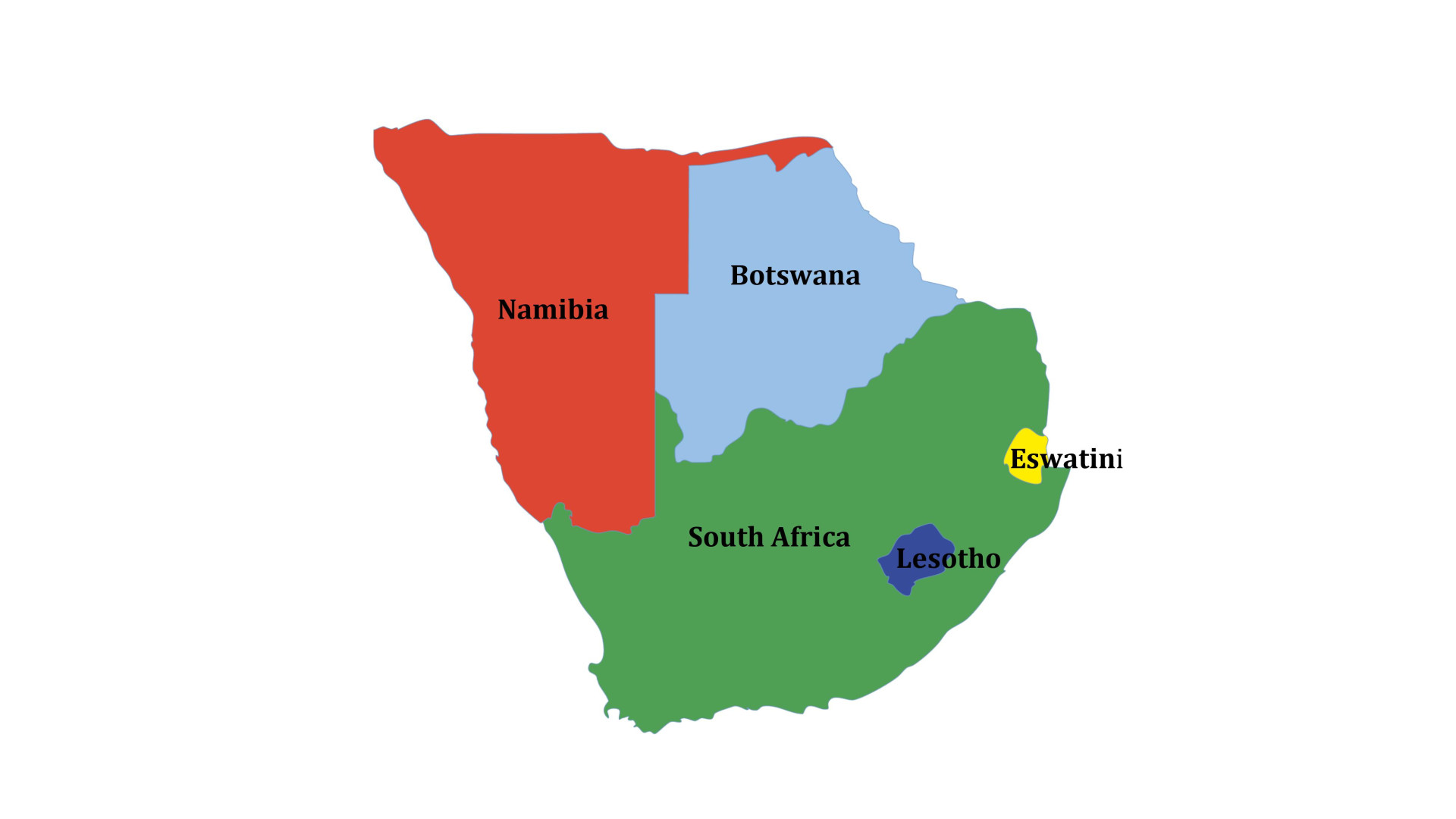
The SACU Secretariat is based in Windhoek, Namibia, and is headed by an Executive Secretary.
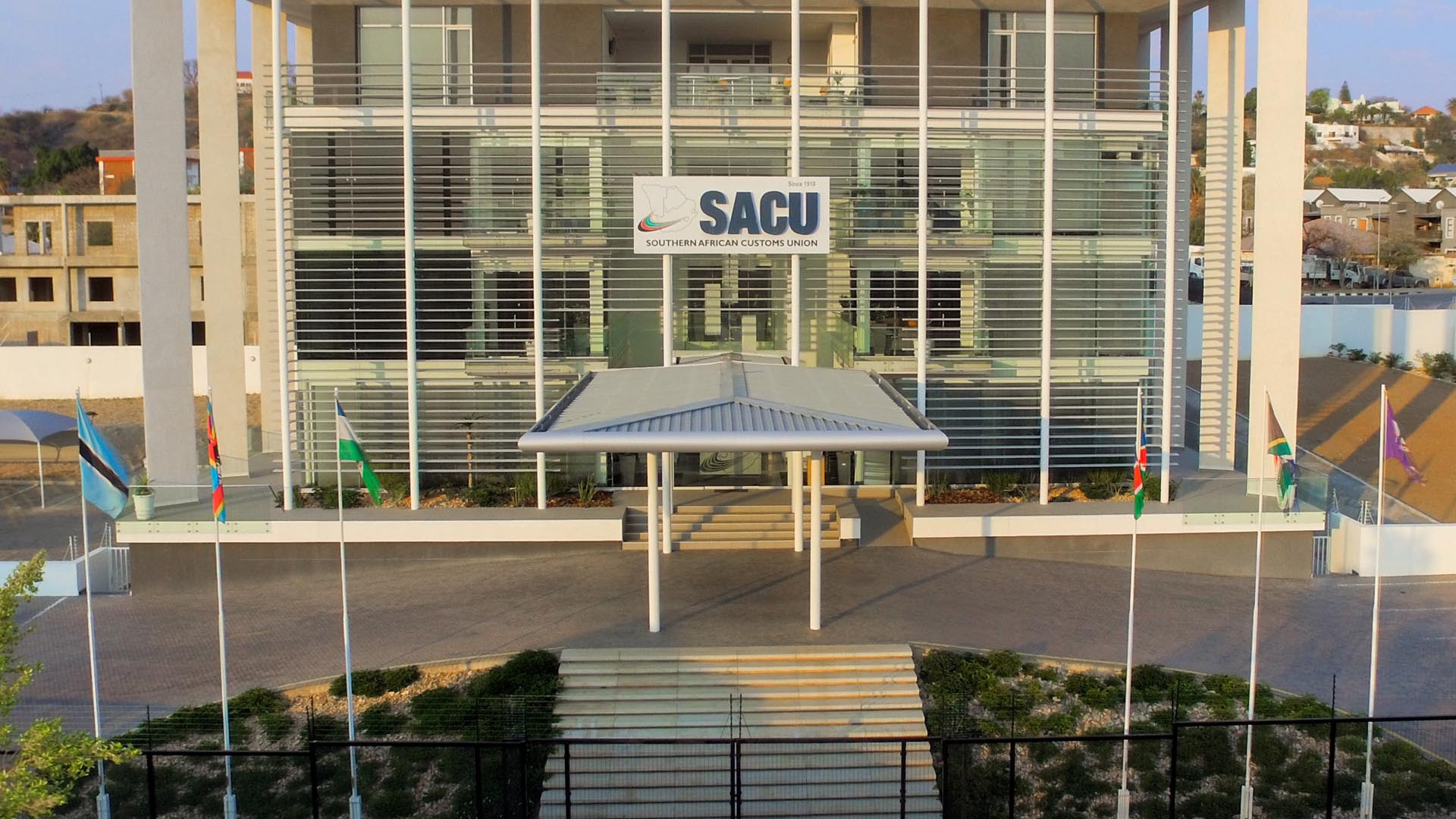
SACU institutions are set out in Article 7 of the SACU Agreement, 2002 (as amended in 2013). These are: the Summit, the Council of Ministers, the Commission, the Tariff Board, the Secretariat, the Technical Liaison Committees and an ad hoc Tribunal.)
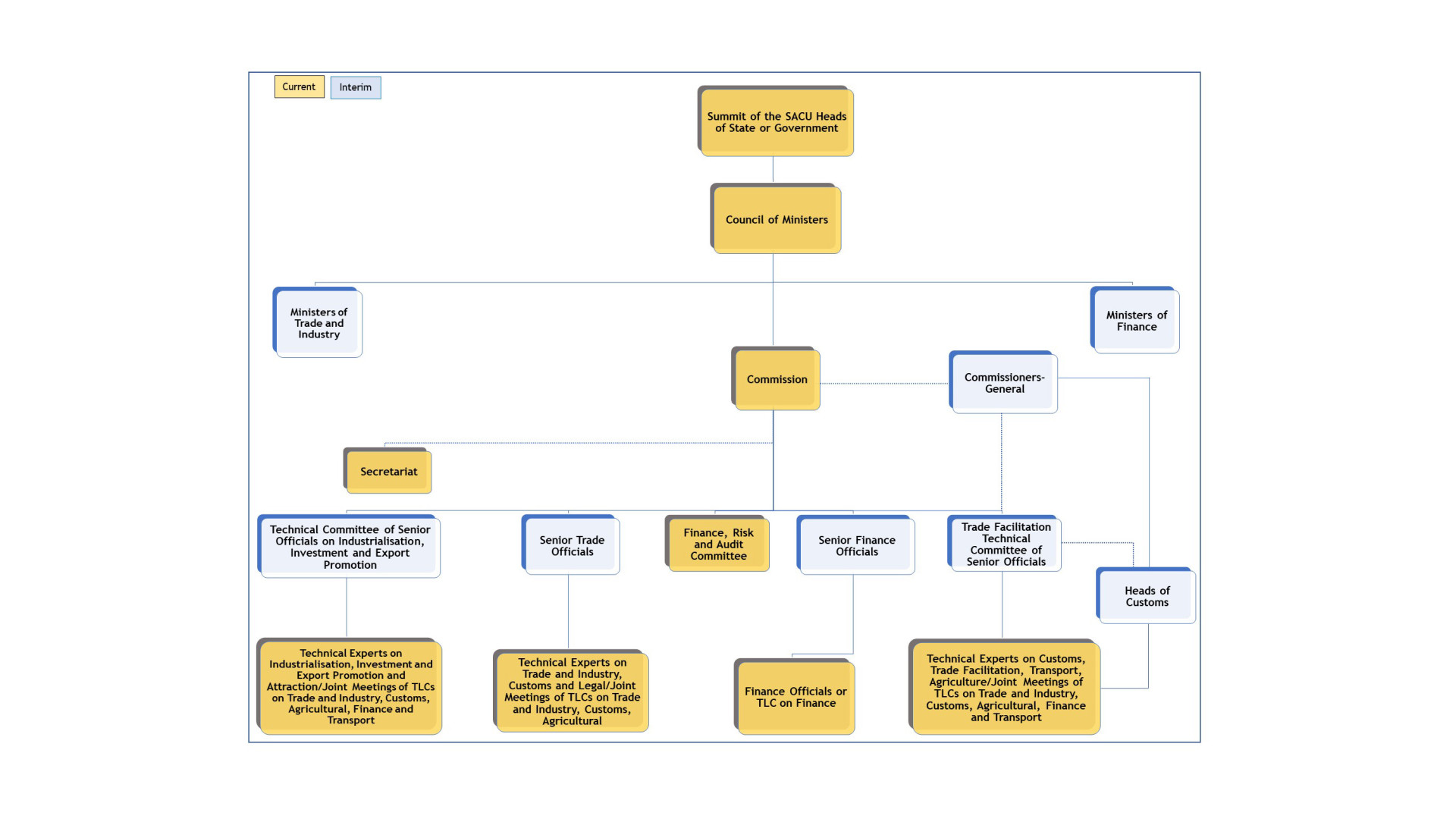
As of October 2020, SACU undertook to promote industrial development through the development of regional value chains (RVCs), export promotion, and investment. The main goal being contribution towards an integrated regional market that would enhance Member States’ international competitiveness. The SACU Strategic Plan also seeks to improve the region’s industrial base, promote sectoral complementarities in production, as well as backward and forward linkages that would promote diversification across the region. Furthermore, the SACU region, through this Programme, will pursue a systematic approach and practical steps to deepening industrialisation whilst simultaneously positioning the region to take full advantage of the opportunities presented by the African Continental Free Trade Area (AfCFTA).
In this regard SACU Member States have selected a number of priority sectors that would be targeted for the development of Regional Value Chains (RVC).These are Agro-processing (Leather and Leather products, Fruits and Vegetables, Meat and Meat products), Textiles and Clothing and Cosmetics and Essential Oils. These sectors offer extensive opportunities for the development of RVCs across SACU. To advance this work, a series of Sectoral Roundtables focusing of the priority sectors were held between March and July 2021. The Sectoral Roundtables identified the development and investment potentials in the priority sectors, along with the policy constraints and challenges faced by the industry within the SACU Region.

In line with the decision of the 13 th Extra Ordinary Session of the African Union (AU) Assembly held on 5 th December 2020, trading under the AfCFTA started on the 1 st January 2021. SACU regards the AfCFTA as a strategic continental instrument; hence, the implementation and leveraging of the AfCFTA has been prioritised as one of the pillars that underpin the recently approved SACU Strategic Plan for 2022–2027. SACU aims to position itself to take full advantage of the AfCFTA through industrialisation, the development of regional value chains, export promotion and investment attraction and promotion.
All SACU Member States have ratified the Agreement establishing the AfCFTA and the Tariff Offer of 7111 tariff lines, which represents 90 percent of the SACU Tariff Book in line with the Agreed Modalities for Tariff Liberalisation, was submitted to the AfCFTA Secretariat on the 13 th February 2023. The implementation of the AfCFTA is one of the priority areas in the Strategic plan of the SACU region and the following are the expected results:
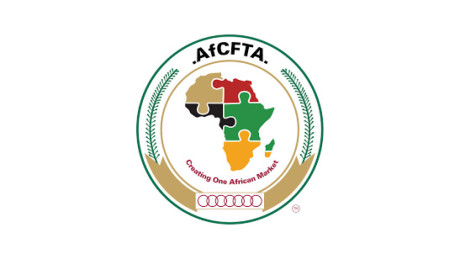 Implementation of the AfCFTA in SACU" />
Implementation of the AfCFTA in SACU" />
The Authorised Economic Operator (AEO) Programme is as a flagship Customs-Business partnership which presents mutual benefits that enables SACU Customs Authorities to share compliance and security responsibilities with the private sector, while rewarding them with various trade facilitation perks. Such partnership initiatives hold the promise of enabling revenue administrations to achieve greater efficiency, aiming for sustainable and long-term voluntary compliance through incentivisation.
Participants in the AEO Programme are required to uphold stringent internal operational standards and demonstrate a consistent track record of compliance. In return for their adherence to these standards, businesses receive a range of benefits aimed at bolstering their operations. The AEO program aligns with international compliance frameworks, emphasising the importance of enhanced voluntary compliance. This necessitates Customs to place increased trust in traders who actively opt for compliance, thereby fostering a collaborative approach towards ensuring regulatory adherence and facilitating smoother international trade processes.
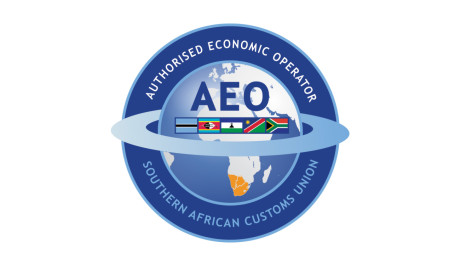
Part 5 of the SACU Agreement, 2002 (as amended in 2013), provides for Trade Liberalisation. Article 31 on Trade Relations with Third Parties establishes a framework that facilitates the region's integration into the global economy, fostering increased trade and participation in global value chains. SACU Member States have pursued a unified approach to negotiations with third parties. Since 2002, Member States have concluded several trade negotiations as a bloc with some key trading partners. Article 31 of the 2002 SACU Agreement require the SACU Member States to negotiate trade agreements with third parties as a collective. The SACU Secretariat coordinates the SACU negotiating agenda, i.e. negotiations with third parties, and implementation of agreements. Member States conduct the negotiations and implement the agreements. The SACU Secretariat further supports policy development and harmonisation of national policies and strategies of SACU Member States as far as they relate to SACU.
Concluded Agreements with Third Parties:
The SACU Member States are also engaged in these ongoing trade negotiations:

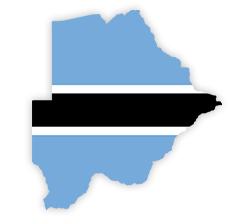
Botswana is the world's largest producer of diamonds and the trade has transformed it into a middle-income nation. Botswana is trying to reduce its economic dependence on diamonds, moving to boost local business and employment by encouraging more value to be added to diamonds locally. Botswana protects some of Africa's largest areas of wilderness. It is sparsely populated, because it is dry. The Kalahari Desert, and most areas are too arid to sustain any agriculture other than cattle.
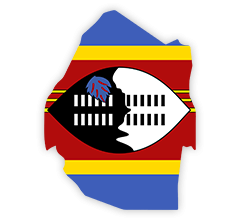
The Kingdom of Eswatini is an independent Monarchy, rich in traditions and heritage, led by King Mswati III, since 1986, as Executive Head of State with parliament and consultation prescribing laws and Customs. Eswatini is a Kingdom in Southern Africa, and covers an area of 17,363 square kilometres. Eswatini is virtually homogenous, most of the population being of the same tribe. Economically, Eswatini trades mainly with South Africa, which receives almost half of Swazi exports and supplies most of its imports.
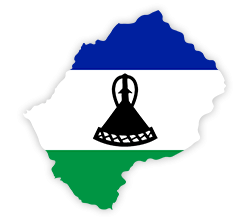
The Kingdom of Lesotho is made up mostly of highlands where many of the villages can be reached only on horseback, by foot or light aircraft. During the winter shepherds wearing only boots and wrap-around blankets have to contend with snow. While much of the country, with spectacular canyons and thatched huts, remains untouched by modern machines, developers have laid down roads to reach its mineral and water resources. Lesotho is one of few African countries to see snow regularly. The Lesotho Highlands Water Project was completed in the 1990s to supply South Africa with fresh water.
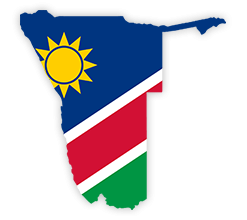
Namibia, a large and sparsely populated country on Africa's south-west coast, has enjoyed stability since gaining independence in 1990 after a long struggle against rule by South Africa. Namibia achieved independence in 1990 after a bush war of almost 25 years. Inter-racial reconciliation encouraged the country's white people to remain and they still play a major role in farming and other economic sectors. Deserts occupy much of the country; their dunes take on shapes and colours according to the elements. The country also boasts game-rich grasslands and a semi-arid Central Plateau, large tracts of which are given over to livestock farming.
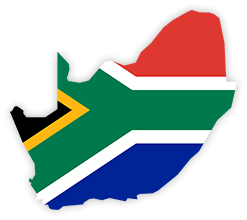
Diversity is a key feature of South Africa, where 11 languages are recognised as official, where community leaders include rabbis and chieftains, rugby players and returned exiles, where traditional healers ply their trade around the corner from stockbrokers and where housing ranges from mud huts to palatial homes with swimming pools. South Africa has one of the continent's biggest economies, though this went into recession in May 2009 following a sharp slowdown in the mining and manufacturing sectors. The construction industry, on the other hand, benefited from a huge programme of government investment ahead of the 2010 World Cup. South Africa is, along with China, Brazil, Russia and India, a member of the BRICS club of emerging world economic powerhouses.
SACU predates modern trade and customs Agreements, and it remains the oldest functioning Customs Union. It was originally established by the British colonial power in the 1880s. In 1889, a Customs Union Convention was held between the British Colony of the Cape of Good Hope and the Orange Free State Boer Republic, preceding the formal establishment of SACU in July 1910.